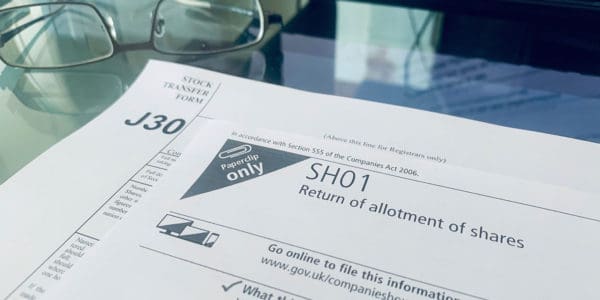When a shareholder leaves a company, their shares need to be transferred by sale or gift to someone else. This is because you cannot have unallocated shares in a company. Below, we explain how to transfer shares and remove a shareholder from a limited company.
Shareholders can leave a company at any time after incorporation for any number of reasons, whether to recoup an investment, remove their association from a company, or as a result of illness or death.
Key takeaways
- Ensure your shareholders’ agreement includes clear procedures for share transfers, especially in cases of death or disputes.
- Update the Register of Members promptly to reflect any changes in share ownership to maintain compliance with regulations.
- Consult a solicitor when drafting shareholder agreements to navigate complex situations and avoid costly disputes.
Whatever the reason, the process of selling or gifting shares must be in line with any provisions stipulated in the company’s articles of association, such as pre-emption rights, and initiated through a Stock Transfer Form.
The Stock Transfer Form should be submitted to the board of directors for approval. When the transfer is approved, a share certificate should be issued to the new shareholder. You can download a free share certificate template here.
The directors must update the company’s Register of Members, in addition to notifying Companies House on the next Confirmation Statement (formerly the annual return) to ensure that the information held on the public register of companies is accurate and up to date.
The death of a shareholder
If a shareholder dies, the shares form part of their estate. The executors of the will then enact their will, signing the Stock Transfer Form in this capacity. Again, it befalls the board to accept the transfer (taking into account any requirements under the company’s articles of association) and update the Register of Members as appropriate.
Many companies include provisions in a shareholders’ agreement to deal with the death of a shareholder. It is common for an agreement to dictate that, upon the death of a shareholder, their shares will pass to a specific person or be made available for purchase by the company or existing company members.
The death of a shareholder is a particularly complex area for many companies, so it really is best to consult a solicitor and prepare an effective shareholders’ agreement that provides clear resolutions for the transfer of shares due to death.
Forcing a shareholder to leave
Shareholder disputes can cause a number of problems, so try to avoid them as best you can. It’s incredibly difficult to force members to leave a company. After all, they are under no obligation to sell their shares unless the shareholders’ agreement or articles are well-drafted to include a specific departure procedure.
The first course of action you must take to resolve an issue should be a negotiation. The majority shareholders could offer a fair value for the minority’s shares.
If they refuse to negotiate, you could then take drastic measures by winding up the company. However, you can only do this if the minority has less than 25% of the issued shares. You will need a 75% majority of shareholders’ votes to pass a special resolution to wind up the company.
If the company is solvent, winding up the company may be a feasible option. You can start a members’ voluntary liquidation and transfer the company’s assets to a new company that excludes the minority. This can be costly and time-consuming, but it may be the only course of action in certain situations.
Best advice: avoid this potential nightmare by drafting a sound shareholders’ agreement when the company is set up. Otherwise, consult a solicitor for professional advice.
Updating the register of members
Every limited company must keep a Register of Members. This statutory register is used to record the names and addresses of all members (or guarantors if the company is limited by guarantee), the date they were registered as a member of the company, details of the shares they hold, and the date they ceased to be a member (where applicable).
Shareholders become members on the date they purchase new shares or receive existing shares via transfer. They cease to be members on the date their shares are transferred to someone else.
It is the responsibility of directors to ensure that this register is accurate, up to date, and kept available for public inspection at the company’s registered office or alternative inspection location (SAIL address). Therefore, this register must be updated as soon as possible whenever a company chooses to add or remove a shareholder.
Notifying Companies House when you remove a shareholder
You must notify Companies House if you bring in a new shareholder or remove a shareholder from your company. These changes should be reported in Part 4 of the next Confirmation Statement. However, we recommended updating the Confirmation Statement immediately after the transfer.












Join The Discussion
Comments (19)
Hi! Quick question here. The relationship between my business partner is broken and we are currently in a dispute where we can’t agree on whether to fold the company or for one stakeholder to sell his share to the other stakeholder. Is there an option for me to gift him my share and walk away from the business? We own the business 50/50.
Thank you for your kind enquiry.
As a general rule, it’s not as straight forward as gifting your shares to another shareholder. For example, from an administrative perspective an administrative, the transfer would need to be approved by all directors. There are various other methods a shareholder could look to exit from a company in addition to giving their shares to the other shareholder(s) (for example, with the company purchasing the shares), however since you are in dispute we strongly suggest you seek legal advice.
We trust this information is of use to you.
Kind regards,
The QCF Team
I along with 3 others registered a ltd company. 1 share for each of the 4 directors, 3 weeks later i was removed from my directorship, and my shares were allocated to x 2 other directors without my knowledge, They just updated a conformation record and BOOM i was gone and my 25% shares… it looks as though the company is going to be quite profitable after i spent a lot of time getting it to this stage… what can i do? any advice would help… companies house wont even tell me the names of who removed me?
Regards
Steve
Thank you for your kind enquiry, Stephen.
We are very sorry to hear of your experience. Although we can’t comment on specific cases, we have set out some thoughts below.
A person’s directorship cannot be terminated unless it is carried out in accordance with section 168 of the Companies Act 2006 or in line with special provisions with the company’s articles of association. The same can be said as regards the transfers of shares. Unless very specific provisions have been placed into your articles of association (for example, “compulsory transfers” which compel a shareholder to transfer their share(s)), or a separate arrangement has been agreed through a shareholder agreement, the normal rule is shares cannot be transferred without the consent of the holder. Unfortunately, the “fix” to a situation similar like this is unlikely to be straightforward. We would therefore suggest you seek legal advice as to the possible options available to you. Generally, when shareholders are subject to unfair prejudice, one option open to them might be to submit a petition to the court. However, this is just a general rule and we must stress we are not solicitors and can’t comment on specific cases.
We are sorry we could not be of more assistance in this instance.
Kind regards,
The QCF Team
We attempted a purchase of shares in a limited company I work for, in July, paid all the money, and the director did no paperwork for these shares despite several requests. 6 weeks later things turned sour and i was forced to leave the company. Still no paperwork and company refused to refund the investment. In September our solicitor instructed him to refund our money, his response was to file a confirmation statement, showing the shares had been transferred in December 2021. This was challenged and at the end of October he finally gave me an unexecuted J30 form (claiming to transfer the shares from his wife not the director i had the agreement with) and a share certificate. A month later after more pressure from our solicitor he produced he produced a members register, and promptly has altered his articles of association stating he has the right to buy the shares at a ‘fair valuation’ which is 14% of the valuation he gave me and if i don’t agree he will compulsory buy them back for the nominal value of £5. We have solicitors on the case, and our opinion is the sale was never completed as the Stock transfer form was never given to us or stamped (executed) and no stamp duty has ever been paid, so we are taking legal action on this basis. we have never acknowledged ownership of these shares, but he insists we have them, and is determined to go down this route. Assuming for 1 second that the court finds that we own the shares, can he remove me from company’s house and his register of members without any consent or authorization from me without court action?
Thank you for your query, James.
In general terms, there’s no specific procedure under the Companies Act that forcibly transfers shares away without the consent of the holder. A share is a person’s property and, like all other property, it belongs to its holder. So unless something is agreed before shares are taken up, we really can’t see there being many ways where they can simply be removed from said holder.
We trust this information is of use to you.
Kind regards,
The QCF Team
My partner and I have a Ltd company where we have number of properties in. I own 40% and he owns 60% of the shares. We have now split up and without my consent he transferred my shares to my 15 year old child.
I have asked for these shares and to give me the value of the shares but he is refusing.
What can I do?
Thank you for your kind enquiry, Sarah.
In general terms, if you are the owner of the shares in question, it is not possible for your ex-partner to transfer the shares effectively without your consent. However, this is a legal matter and you would need to challenge this transfer in court.
We would therefore advise you seek legal counsel regarding this matter.
Kind regards,
The QCF Team
I have started an LTD with my girlfriend however after few months we decided this is not gonna work and she decided to pass me her share in exchange of what she invested in the company. I am more than happy just to refund her part and continue on my own.
We did not have any activity with the company (no income so far) in this time and we only contributed £500 pounds. Is any easy way to sort this? Thank you
Thank you for your kind question, Iulian.
From a company secretarial perspective, it appears that a simple transfer of shares (with the consideration amount being the amount your girlfriend invested) would be the easiest way for you to place the company into a position where you are the only shareholder of the company.
You may be interested in our Transfer of Shares service, which provides you with all the company secretarial documentation you need to complete your transfer for just £69.99 – the link to this service is: https://www.qualitycompanyformations.co.uk/services/transfer-of-shares/. Alternative methods include carrying out a purchase of own shares, wherein the company purchases your girlfriend’s shares, after which they are cancelled, leaving only yours remaining in issue. From an administrative perspective, the former method remains the simplest, although please note we cannot provide any advice as regards tax, etc.
We trust this information is of use to you.
Kind regards,
The QCF Team
can my husband revoke his directorship so that he will not have to pay me half his share of the business when we divorce?
Thank you for your kind enquiry.
Directorship has no bearing on the value of the ownership of a business. Directors manage the business on behalf of the shareholders (owners). If your husband is a shareholder and attempts to sell or relinquish ownership so that he does not have to provide you with some during a divorce settlement, any money received would instead need to be part of the settlement disclosure. If no money was received for the shares or the company was dissolved, then you would not be entitled to anything as he would have received no financial benefit which could be shared between you.
In short, the only instance whereby this would prove dubious would be if your husband sold the shares for a defined period of time before the divorce settlement and then bought them back afterwards for a smaller fee, as part of a private deal. If you suspect such a thing may occur or have occurred, you should seek legal advice.
I trust this information is of use to you.
Regards,
John
Please I was given shares as a minor in my father’s company, but wasn’t aware till 20yrs later, now those shares aren’t available anymore and my name isn’t on the shareholders list and the man is late.
1. What legal options can I take?
Thank you for your kind enquiry, Andre. In general terms, you would need to consent to the selling of your shares to another party, if the company is still in existence and hasn’t been dissolved in the intervening period. If the same company exists and someone has sold your shares on your behalf without your consent, this would constitute fraud. We would suggest you may wish to take civil action against the company via the Courts if this is the case. Unfortunately there is no other mechanism to rectify the situation you are describing.
If on the other hand the company has dissolved in the intervening period, you would no longer automatically be entitled to shares in the new company.
I trust this information is of use to you.
Kind regards,
Nicholas
So me and my two sisters are shareholders and directors of a private limited company we all own 33% each but my two sisters always outvote me I wanted to sell my shares and be done with the business there’s a clause in the articles of association that one of them will need to buy me out but they both not interest what legal action can I take to be done and sell my shares
Hi Zainab,
Thank you for your kind enquiry.
If you wish to leave the company as a shareholder, you can arrange for a transfer of your shares to another individual (this can be an existing shareholder or new shareholder). Our Transfer of Shares Service provides all of the documentation you need to undertake this. Our fee for assisting with this matter is £49.99 plus VAT.
Kindly note that the directors of the company can refuse to approve the transfer – in such cases you should seek legal advice.
I hope this information is of use to you.
Kind regards,
Graeme
I opened a ltd company which i then gave shares to my 2 sisters of 33% each. I did this as an online document. Since then my 2 sisters have put the company at risk by witholding taking and 1 sister took a government grant from the business account. The account was blocked at the time and also needed signatories from the other shareholders. This has left the company very vunerable as there will be no money to pay creditors. Can i remove them for gross misconduct? Thank you
Thank you for your kind enquiry, Elaine.
To transfer shares away from your sisters, they would need to complete a transfer of shares process via the relevant Companies House paperwork. This will require the shareholders currently holding the shares and passing them to you to sign the relevant documentation. It would appear from the scenario you describe that you will not gain their consent to do this. If you do not have consent to transfer the shares from the present shareholders (i.e. your sisters) to yourself, we recommend you seek professional legal advice.
I hope this has been of use to you.
Kind regards,
Sulltana
can a company Director cause a shareholders agreement to be invalidated?